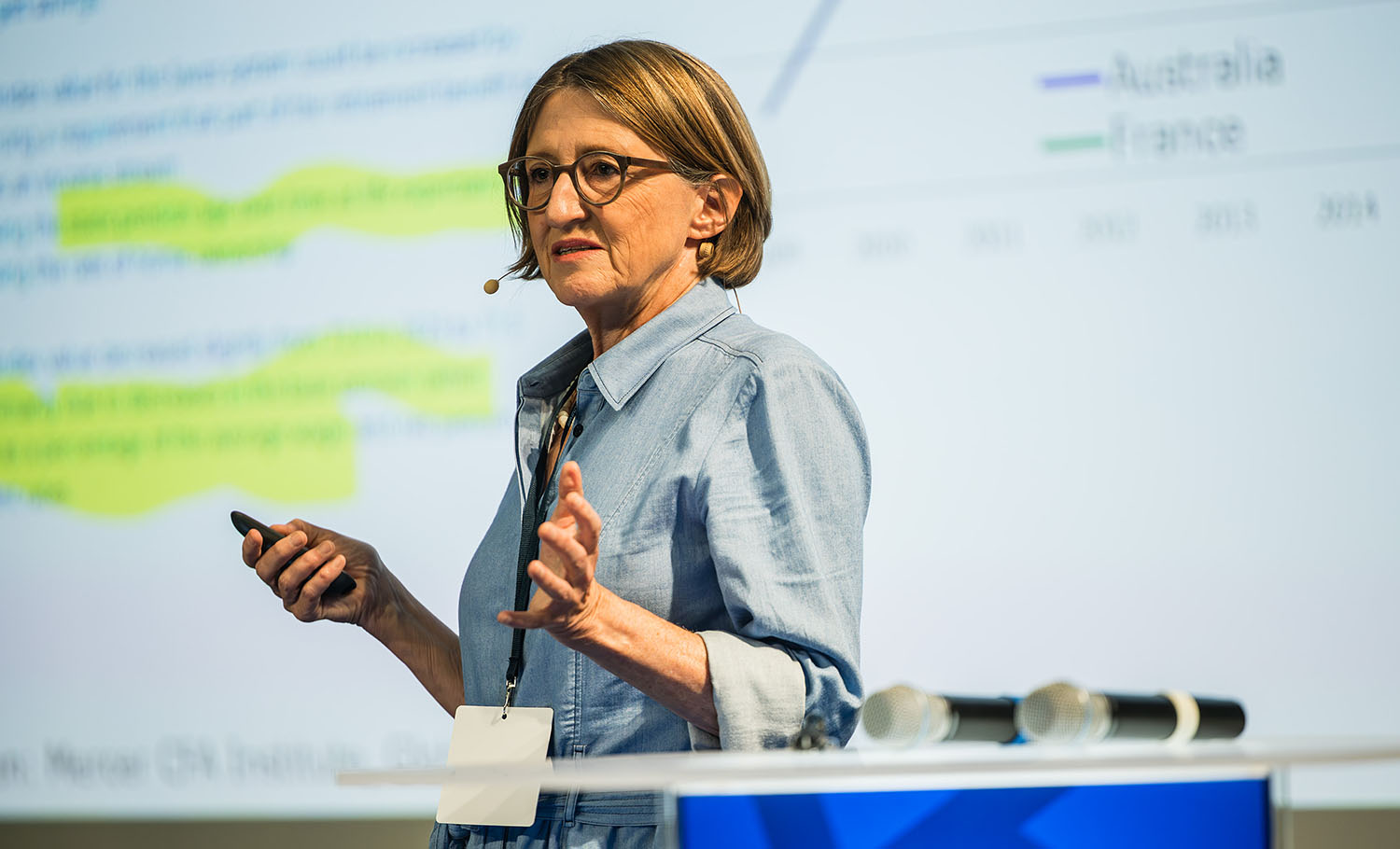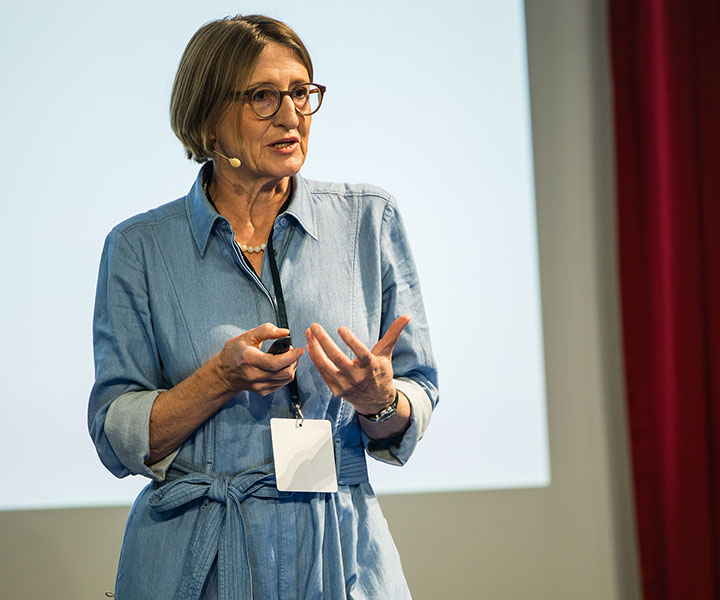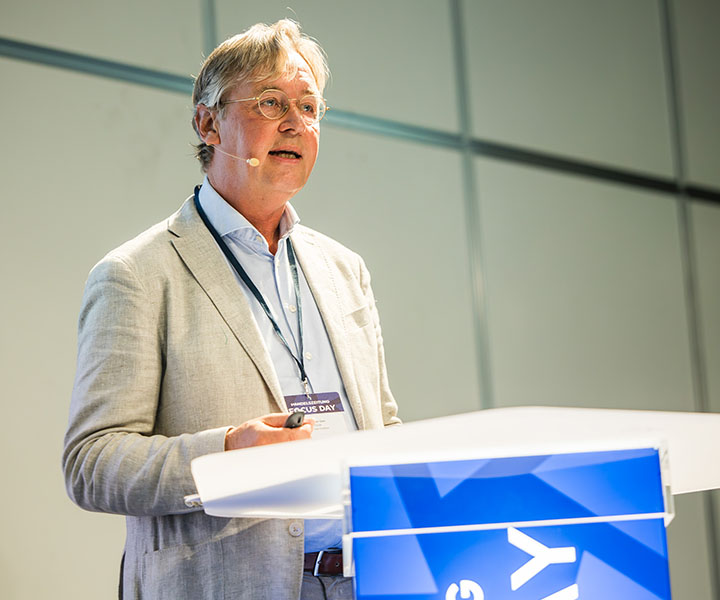Interview with economist Monika Bütler: "The second pillar was cast in too rigid a mould"
29 October 2025 | Comment(s) |
Martin Kamber

Monika Bütler is one of the most prominent voices in the country when it comes to social security and, in particular, our pension system. At the 3rd HZ Focus Day, organised by the Handelszeitung and supported by Groupe Mutuel, the honorary professor at the University of St. Gallen captivated her audience with her stimulating presentation. She left no doubt about the need to adapt the second pillar pension system.
Monika Bütler has always been a person with a keen sense of curiosity, and she has retained that characteristic. After studying mathematics and physics, Monika Bütler went on to study economics. "I always wanted to understand how the world works, both physically and socially, and to contribute to that understanding," said the keynote speaker at the 3rd HZ Focus Day, which took place at the Kunsthaus Zurich at the end of August 2025. She added: "I still think it's important to look at problems from different angles. And to recognise that there are often no easy answers."
Ms Bütler, what fascinates you about the topic of old-age pension provision?
I find it fascinating that old-age pension provision covers very long periods of life and involves many decisions that require interesting trade-offs. From an individual's point of view, it is a question of finding a balance between consumption today and consumption tomorrow, i.e. savings. Both rational and less rational aspects come into play here. At the political level, it is the trade-off between redistribution and efficiency that I find fascinating.
About the person
Monika Bütler studied mathematics and physics in Bern and Zurich. After gaining initial professional experience in applied research and private industry, she studied economics at the University of St. Gallen, where she obtained her doctorate in 1997. From 1997 to 2001, she worked as an assistant professor at Tilburg University in the Netherlands, and from 2001 to 2004 as a full professor at the University of Lausanne, before returning to the University of St. Gallen in 2004 as a full professor of economics and economic policy. She was co-founder and director of the Swiss Institute for Empirical Economic Research (SEW). Monika Bütler has been self-employed since 2021.
Old-age retirement provision in Switzerland was long considered exemplary. According to the Mercer CFA Institute Global Pension Index, it now ranks only 12th in international comparison. What has happened?
Firstly, many countries have caught up, which is encouraging. On the other hand, Switzerland has failed to adapt the system to the new demographic realities and has thus lost the trust of the population. This loss of confidence worries me almost more than the lack of reforms. Pension funds have done a good job of mitigating the impact of rigid and sometimes market-unfriendly regulations such as the conversion rate. The price to pay for this? Complex calculations and the unequal treatment of insured persons, which undermine their confidence and make reforms even more difficult.
The population lacks confidence, but also knowledge, and in particular "financial literacy". In your opinion, what are the gaps that need to be filled as a matter of priority?
Unfortunately, there are many gaps in knowledge. It's not just about financial literacy, but also about simple economic relationships. But what has particularly struck me in politics recently is the unwillingness to discuss conflicting objectives. Every measure, every decision has costs and benefits.

"The loss of confidence among the population worries me almost more than the lack of reforms."
In light of the new realities in the world of work and the ageing population, what should be the priority objectives for occupational pension provision?
Actually, today's goals – above all, securing the standard of living after retirement, for surviving dependants and in the event of disability – are still valid, as the first pillar (AVS/AHV) is responsible for basic security. Here is what I would change or add: firstly, that self-employed persons can also be insured within the same framework. Secondly, that the continuity of pension provision is also guaranteed during periods of leave. And thirdly, that there is a pension equalisation between parents, regardless of whether they are married or not.
At the HZ Focus Day, you specifically pointed out the changing self-image of women. What action do you think needs to be taken with regard to the LPP/BVG?
The interesting thing is that the gender gap in pensions has only been discussed for a few years, even though it has always existed and has tended to narrow over time. The legitimate concern to reduce these differences has its origins in the rise of the women's movement.
The gender gap exists wherever wages are the main determinant of future pensions. In Germany, for example, this also applies to the first pillar. There is no gender gap in the Swiss AVS/AHV, firstly because there is compensation between married couples, secondly because there are credits for caring for children, and thirdly because the AVS/AHV is only very weakly dependent on wages. Equalisation between parents – whether married or not – would be a good approach to significantly reduce the differences in the second pillar as well.

Thinking outside the box: guest speaker Jaap van Dam gave the audience at the HZ Focus Day 2025 an insight into pension provision in the Netherlands.
Which approach do you think offers the best chance of addressing the consequences of an ageing population: making retirement age more flexible, automatically increasing retirement age, or reducing the conversion rate?
In my view, the only way to secure the financing of retirement provisions is to increase the duration of working life. I don't think that the automatic increase in retirement age is the best solution, but rather a slow and predictable increase in retirement age with social cushioning and consideration of working life. This is not easy to implement, but abolishing the privileges of the years spent studying would be a first step.
At HZ Focus Day, you outlined the idea of deferred pensions. Are there any models for this?
Not in state pension systems, as far as I know, but in private pension companies in the US and the UK. The idea is to allow the most flexible use of retirement capital possible while simultaneously hedging against the risk of longevity.
What do you mean by the "longevity risk"?
Many years ago, I set up a thought experiment to show my students who the bad risks are in old-age provision. It is not the sick and frail, but the fit and healthy, because of their higher life expectancy. It becomes really controversial when the pension of a healthy person is compared with the pensions of alcoholic individuals, smokers and overweight people. All these people would have to receive a higher pension to compensate for their lower life expectancy.

Over 200 interested parties found their way to the Kunsthaus Zurich for HZ Focus Day 2025.
The current trend is not in favour of postponing retirement age but rather of withdrawing one’s capital amount: more and more people are asking for their retirement lump-sum amount to be paid out. How do you view this trend?
It’s worrying. Firstly, because the risk of longevity is no longer covered – often at the expense of the general public. Secondly, because managing a capital amount is very challenging and many mistakes can be made. However, I do not think that equal tax treatment of capital and pensions, which I very much welcome in the second pillar, would really change the trend.
Finally, on the occasion of the 40th anniversary of the LPP/BVG: how well do you think the second pillar has aged?
That's a difficult question! The basic idea remains excellent, especially as a supplement to the state pension scheme (AVS/AHV). However, the LPP/BVG was cast in too rigid a mould. In other words, if the second pillar system were a sprinter, I would say that politicians gave it shoes that are far too small and too tight, which is why it is moving more slowly than it could!

Closing panel discussion with (from left to right): Michael Hermann (political analyst, founder of Sotomo), Eliane Albisser (managing director of PK-Netz), moderator Dr Hugo Bigi, Petra Feigl-Fässler (head of HR at Migros Industrie and member of the Board of Groupe Mutuel) and Dr Simon Schnyder (Head of Social Policy SGV).






